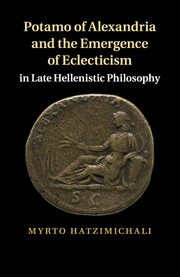Book contents
- Frontmatter
- Contents
- Acknowledgements
- Abbreviations
- Introduction
- Chapter 1 Eclecticism in modern and ancient thought
- Chapter 2 Eclecticism and Alexandria in the first century bc
- Chapter 3 Potamo of Alexandria, life and work
- Chapter 4 The eclectic system of Potamo's Elementary Teaching
- Chapter 5 Potamo and Aristotle's On the Heavens
- Chapter 6 Further references to Potamo
- Chapter 7 Conclusions
- Bibliography
- General index
- Index of passages cited
- References
Chapter 1 - Eclecticism in modern and ancient thought
Published online by Cambridge University Press: 05 July 2011
- Frontmatter
- Contents
- Acknowledgements
- Abbreviations
- Introduction
- Chapter 1 Eclecticism in modern and ancient thought
- Chapter 2 Eclecticism and Alexandria in the first century bc
- Chapter 3 Potamo of Alexandria, life and work
- Chapter 4 The eclectic system of Potamo's Elementary Teaching
- Chapter 5 Potamo and Aristotle's On the Heavens
- Chapter 6 Further references to Potamo
- Chapter 7 Conclusions
- Bibliography
- General index
- Index of passages cited
- References
Summary
Eclecticism as a technical term in modern scholarship
Eclecticism has become a popular category for describing an intellectual stance that involves approving of and adopting views that are not part of a uniform tradition, but might stem from different, even incompatible, ideologies. In the study of ancient philosophy the term is used, often in a derogatory sense, for the appropriation of elements that do not form part of the ‘official’ set of doctrines propagated by the school one claims to belong to. The pejorative connotations usually arise from the assessment that these foreign elements are not properly and coherently integrated. This widespread modern usage is overwhelmingly associated with thinkers who did make claims of allegiance to a particular mainstream school such as the Stoa or the Academy, while it seems to leave outside its scope the establishment of a sect with a self-proclaimed eclectic agenda from the outset, an intellectual enterprise that is quite different from the progressive incorporation of ‘alien’ material into a dominant system. This type of initiative is worthy of independent study, with the understanding that a philosopher who chooses to call himself ‘eclectic’ and in addition tries to create a new group and attract a following based on precisely this agenda must be offering something more radical than a modification of one school's ideas. The information we have for one such philosophical movement in Antiquity, initiated by Potamo of Alexandria towards the end of the first century bc, is indicative of a sui generis project.
- Type
- Chapter
- Information
- Publisher: Cambridge University PressPrint publication year: 2011



